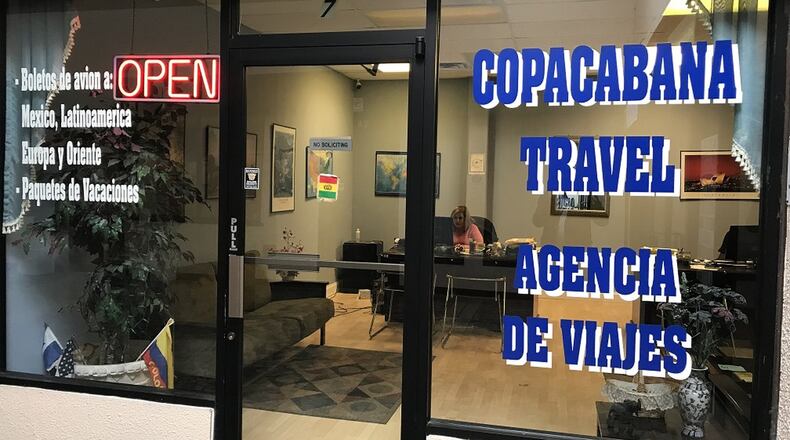The path to reunification for some immigrant families who have been split up amid the Trump administration’s crackdown on the southwest border runs through an aging strip mall in the Atlanta suburbs.
Sitting around the corner from a thrift store and a coin laundromat at Lawrenceville Square, Copacabana Travel Management is the small travel agency recommended by the largest network of shelters caring for the immigrant children.
Now an immigrant aid group is crying foul, citing high travel costs and saying the nonprofit shelter agency, Southwest Key Programs, has pressured its clients to use Copacabana. Southwest Key, a Texas-based nonprofit that is housing about 3,900 of the children through an agreement with the federal government, could not say who began referring parents to Copacabana or precisely when, but it insists immigrant parents can make their own travel arrangements.
The New York Times reported in December that the U.S. Justice Department is probing Southwest Key for possible misuse of federal money. The nonprofit allegedly engaged in potential self-dealing with its top executives, stockpiled tens of millions of taxpayer dollars and lent out millions for real estate purchases, acting more like a bank than a traditional charity, according to The Times' reporting. The Justice Department declined to comment.
Southwest Key, which has reportedly collected $1.8 billion in federal grants in the past decade, announced Monday that its founder and CEO, Juan Sanchez, is retiring. In a statement, Sanchez said "unfair criticism" had become a distraction for employees and that Southwest Key would benefit from "a fresh perspective." A spokesman for the nonprofit said his retirement is unrelated to Copacabana but declined to comment about the federal investigation.
First reported by Texas Monthly, the controversy surrounding Copacabana comes as the Trump administration is still working to reunite immigrant families separated at the southwest border. Facing a storm of protests over his administration's "zero tolerance" policy, President Donald Trump signed an executive order in June that was meant to end such separations. Yet, the government has split up 245 immigrant families since that month, federal court records show.
Immigrant Families Together, a New York City-based humanitarian organization that is helping immigrant families reunite, told The Atlanta Journal-Constitution that Southwest Key has referred at least six of its clients to Copacabana in recent months. Among them was a Guatemalan man who sought in August to get his then-15-year-old son on a flight from Southwest Key’s shelter in Brownsville, Texas — a converted Walmart store called Casa Padre — to him in New York City, said Julie Schwietert Collazo, co-founder and director of Immigrant Families Together. He booked his travel through Copacabana, Collazo said, for $1,030.
“It has never been presented to any of the families we have dealt with that Copacabana is a choice,” Collazo said.
Southwest Key started referring people to the travel agency a decade ago, Southwest Key spokesman Neil Nowlin said, because it had a bilingual staff, “worked extended hours and accepted Western Union and MoneyGram (money transfers) — all important to the families we are serving.” No one at Southwest Key remembers who first began steering people to Copacabana, said Nowlin, adding the two organizations don’t have a contract. Nowlin said his agency has not kept track of how many referrals it has made to Copacabana.
After Texas Monthly published its article this month, Southwest Key sent an email to its caseworkers, telling them parents can book their own travel, use travel agencies other than Copacabana or come to the shelters and pick up their children.
“Many choose to ask for help because arrangements must be made quickly,” Nowlin said. “We have 72 hours between the time we know an unaccompanied minor is approved for reunification and our obligation to get them to their new home.”
Nowlin added that Southwest Key opposes separating immigrant families at the border, calling it “a policy that hurt children, parents and our communities.”
Sandra Quiroga is identified as Copacabana’s manager in Georgia Secretary State records for the limited liability company. She did not respond to requests for comment. A woman working at the front desk at Copacabana’s office in Lawrenceville said she was not authorized to comment.
The company’s attorney, Rodney Gould, said Southwest Key learned of Copacabana by word of mouth years ago after one its customers in Texas had a good experience booking a trip to Central America with the travel agency. He did not know how many bookings Copacabana has handled for immigrant families connected to Southwest Key.
“Copacabana has a pretty good track record of being able to get them on planes and get them where they are going,” he said.
The travel agency collects up to $35 in fees for each trip it books in connection with children under Southwest Key’s care, Gould said. Such ticket prices can run higher than usual, he said, because they must be booked with short notice and sometimes require additional fees for adult chaperones for unaccompanied minors. Gould said he does not expect Copacabana’s relationship with Southwest Key will change based on the reported federal investigation of the nonprofit shelter agency.
“If there is a federal investigation of Southwest Key,” he said, “I am not sure what it relates to, although my guess is that it probably doesn’t relate to anything to do with the ticketing of the migrants going to sponsors.”
About the Author
Keep Reading
The Latest
Featured




